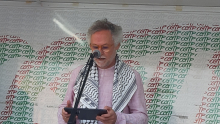"Life only rhymes with freedom", by Carlos Almeida
We teach life, sir.
We Palestinians teach life after they have occupied the last sky.
We teach life after they have built their settlements and apartheid walls, after the last skies.
We teach life, sir.
...
We teach life, sir.
We Palestinians wake up every morning to teach the rest of the world life, sir.
This is where I want to start, dear friends, with the words of the Palestinian poet Rafeef Ziahad.
We who are here know the reason for this moment. Because we have learnt from the Palestinian people how to teach life. We have learnt from the example of the Palestinian people that life is to be lived in freedom, with respect for the dignity of every human being. That every person has the right to live free in the land that saw their birth, without walls, without barriers, without fear of imprisonment, with time and hope to make their dreams come true. That life is incompatible with humiliation, that life cannot stand injustice, that life is the opposite of isolation, torture, and death lurking around every corner. We have learnt from the Palestinian people, and we are here today, once again, as we have been here in the past, as we will continue to be in the future, whenever they tell us that we have to lead our lives with our heads down, begging for compassion, silencing the pain, suffering insults in silence. We have learnt from the Palestinian people that we are nothing if we forget where we come from, if we abandon the memory of who we are, the pain of which we are children.
And we never tire of saying it, even though every time, in every way, we are told that the lives of the Palestinians don't matter; that in that land there are those who always have everything and those who are condemned to never have anything; those for whom everything is always justified, and the others from whom everything will be charged; that some have the right to rape, humiliate, steal, imprison and torture, whereas the others ought to content themselves with pity and commiseration, empty promises, empty words, repeated mechanically, eternally.
No one has learnt to love life and to teach it, free and full, as it should be lived, as the Palestinian people have. They carry more than a century of denial and silence, of forgetfulness and lies, and every day, every dawn, the doors of their homes, the streets of their villages open to the world, in a spirit of solidarity, in an embrace, in fraternal encounter. For the right to this hope, for the unshakeable, ironclad, and immovable belief that the right to freedom belongs to everyone, the Palestinian people pay an unmeasurable price every day. We have learnt from them the singular, unique, and unrepeatable value of life, of all lives, and that is why we are here.
To say enough is enough. Enough of death, pain and suffering. Enough of wars and violence. And no, let not the most distracted be surprised, let them not be amazed. We know, every time we've been here we've said the same thing, always the same thing. Isn't there enough blood? Isn't there enough crying? Aren't a hundred years, more than a hundred years of ethnic cleansing and extermination, a hundred years of machine gun fire, a hundred years of lead, enough for you to realise that no force, no matter how brutal and murderous, can suffocate those who yearn for freedom, that no power is invincible, that no oppression can last forever? Listen, for once, listen to the voice of the poet: "for 20 million impossibilities we will stay". A hundred years, a hundred years and they still haven't realised that the Palestinian people won't surrender, won't kneel, won't beg or resign themselves, that the Palestinian people are the sovereign actors of their destiny and that they will always fight and resist? And do you know why? Do you know the reason, you who spout set phrases, learned lessons on how an oppressed people should or should not resist, what they are or are not allowed to do so that they are entitled to your pious understanding? The reason is simple and complex at the same time. The Palestinians are men and women like us, they just want to be happy, to be recognised in their dignity in the land of their birth, to see their parents and grandparents respected, their children growing up in peace, building a future. They will always fight, always, because that is the dream that fulfils life.
And who can judge them for doing so? Try putting yourselves in the sandals of the grandmothers who, 75 years ago, were thrown out of their homes, forced to abandon their fruit trees, not knowing that they would never return there, that between them and their past there would be an impassable fence, a wall armed with insults, humiliation, and coarseness. Put on the coats of the men who saved themselves more than 50 years ago by fleeing, knowing that behind them were the bodies of their brothers, their fathers, felled by the bullets of those who came to take possession of what didn't belong to them. Put yourself in the shoes of the mothers who ask themselves every morning if they will be able to hug their children at the end of the day when they leave for school. (Yes, it's true, Palestinian children go to school when they can, because they believe in it, because life is what they are taught.) Can you imagine the pain of the fathers and mothers, children, wives, and husbands who wait years on end to one day be able to mourn their loved ones killed in prisons because their bodies are being held by the occupier, in a punitive measure that is as macabre as it is cruel? Can you imagine being subjected to a regime of apartheid, segregation and discrimination, day after day, generation after generation? What if you were promised that one day, maybe, who knows, if you forgot the resolution that promised you 48 per cent of the land that was yours and settled for just 20 per cent, maybe someone would think of recognising some of your rights; and what if 5, 10, 20, 30 years later, you realised that it was all just a hoax, that the 20 per cent of land was no longer even 10, and that every day that passed an olive tree was lost, a house demolished, and that the roads that connected the villages yesterday now lead to nowhere? What would they do? If you looked around, and from the international institutions, countries and organisations that proclaim themselves to be beacons of freedom and democracy, all you got, as now, was silence and indifference, without a shred of empathy, what would you do? With Bertold Brecht, the German playwright and poet, anti-fascist and resistant, we learnt that no one ever calls violent the banks that squeeze the river that drags everything. That's why imagining oneself as another, being able to put on the other's skin, to feel the weight of time on one's shoulders, and humbly recognise one's own fragility in the other's fate is the principle of humanity.
These days, listening to the speeches, the learned and wise comments, the snobbery and arrogance of so many, we realise how scarce is that sense of humanity that comes from the elementary exercise of putting ourselves in the shoes of others and risking feeling a little of their pain and anguish. Like the Palestinian people, we teach life, and that's why we want to state it clearly. We mourn the loss of all lives, Saturday's and Sunday's, today's and yesterday's, the young lives that were lost at a music festival and the lost lives of young people to whom no one ever recognised the right to be able to dance at a music festival, those of 75 years ago, all those that were lost in oblivion, every time medicines didn't get into Gaza, every time an ambulance was barred at a checkpoint, every time medical assistance wasn't provided in Israel's prisons, every time that hordes of settlers sowed terror in Palestinian villages, every time that still-living bodies, riddled by Israeli soldiers' bullets, were abandoned in ditches; all the lives that were lost without a word of indignation being uttered, without the routine of newspapers and television being broken, without any political leader, minister, president, or ambassador being bothered, even if only by a tweet, without anyone on the United Nations Security Council vetoing the condemnation that was needed. All these lives are children of the insane, unjust, illegal, and cruel plan that has been in place for more than a hundred years, which aims to colonise a land and erase from it the physical and historical marks and the very material existence of the people who live there and who have the roots that identify them as a political and cultural entity, deserving as such of rights that are proper to all human beings. That land has a name, it's called Palestine; that entity also has a name, it's called the Palestinian people. Yes, as much as it pains you to hear it, we'll say it again: people, Palestinian people. And these people have a flag, which we make our own because it is the flag of hope that resists, of courage that does not give in to fear, of life, the life we want free!
The seriousness of the moment we are living through cannot be overstated. More than anyone else, the Palestinian people are well aware of the dangers it entails. Knowing this, let's be aware of the perversity hidden in the use of the word "escalation." When we use it, we are somehow assuming that the reality before this so-called "escalation" was somehow tolerable, that there is a level of violence and domination to which it is acceptable to subject a people indefinitely, while every day they are robbed of hope for a future in which their rights are finally recognised.
A few months ago, the Israeli historian Shlomo Sand was in Lisbon. At the end of his lecture, someone asked him how he saw this endless cycle of oppression, discrimination and violence. These days, I remembered his answer: a catastrophe, he said, perhaps a catastrophe will happen. We may be living it. The Palestinian people, those of us who stand in solidarity with their cause, know all too well what that word means. That's why we repeat: Enough! Enough war, enough violence. Both are children of occupation, both are instruments of colonisation and ethnic cleansing. We need to stop the race to the abyss; we need to confront the irrationality of the brute force before us.
Never before has the demand for peace, for peace in the Middle East, been so inextricably linked to recognising the imprescriptible rights of the Palestinian people. And what I'm talking about is real peace, that full and free peace like the life that the Palestinian people teach us. A peace without checkpoints, without colonisation or ethnic cleansing, without administrative prisons, without pogroms, a peace where every man and woman is recognised in their dignity as human beings, free and equal in rights to their fellow human beings, respected in their beliefs and convictions, with the freedom to exercise and affirm them. This struggle is an imperative of our time, and we are called to it. It is our time, our responsibility.
From here we reaffirm our firm and determined commitment to the cause of liberating the Palestinian people.
We learnt from them that life only rhymes with freedom.
That's why we fight.
For peace, against war.
Palestine will win!
Text of a speech by Carlos Almeida, representing MPPM at the Public Demonstration called by CPPC, CGTP-IN and MPPM for Praça Martim Moniz, in Lisbon, on 11 October 2023.


